#chrysanthemum stone
Explore tagged Tumblr posts
Text
Chrysanthemum Stone, also known as Flower Stone, is a unique and visually striking rock characterized by its flower-like patterns.
33 notes
·
View notes
Text
What Crystals Could Be Useful To You Right Now? 🍯

Hey, busy bees! The image you choose will correlate with a card from ‘Mood Crystals’ by Christel Alberez & Nerissa Alberts! Each card expresses an emotion that you could be stagnant in, one you’re trying to embody, or trying to transmute! The card then offers crystal options to utilize and three combinations of crystals to test out together on your journey with the energy you’re situated with! I hope I’m able to bring some guidance! This is just for funsies! I’m not a legal or medical professional! If you’d like a personal reading, dm me for details!
1→2 ↓ 3→4





Option One:
Physical Emotions - Bored:
Option One! You’re bored out of your mind! Or at least a little lower energy than you’d like! Your creativity may be blocked right now or you feel caught up in day to day life! For activities, I’d recommend trying something new! Or getting back to basics! Doodle for a few minutes, listen to music, find a new recipe to try, or go for a walk and take some pictures! Below are some recommendations for stones to help your energy out! I hope they help!
- Bunny 💛🍯
Stones Recommended: Orange Calcite, Fluorite, Quartz, Fulgurite, Smokey Quartz, Picture Jasper, Iceland Spar (Clear Calcite)
Powerful Stone Combos: Fulgurite + Smokey Quartz, Orange Calcite + Iceland Spar, Fluorite + Quartz

Option Two:
Energetic And Transformational Flow - Sensual:
Option Two! Your energy is the opposite of option one! You guys are on a ball! Maybe you’re looking for a way to sensualize yourself and your energy. Give it purpose and poise. Or you’re looking to embrace your body. Maybe you have a low sex drive and you’re looking to change that! I recommend doing some meditative exercises to open up to your sensuality! Find something that makes you feel sensual or even seductive. Regal is a word that comes to mind as well. Music, outfits, things that inspire you to be present and physical in your body. Give yourself some TLC! In whatever way that means! The stones below should help guide and inspire your energy on your journey with sensuality!
- Bunny 💛🍯
Stones Recommended: Rhodochrosite, Orange Kyanite, Shiva Lingam, Fire Opal, Blue Topaz, Blue Calcite, Zincite
Powerful Stone Combos: Orange Kyanite + Shiva Lingam, Rhodochrosite + Fire Opal, Blue Calcite + Shiva Lingam

Option Three:
Energetic And Transformational Flow - Frustrated:
Hey, Option Three! Sounds like you’re frustrated lately! This could be from a situation that experienced stagnancy or it could be frustration with yourself! Be patient with yourself and this situation! An outcome is on the horizon! The stones below should help with your journey in handling this frustration!
- Bunny 💛🍯
Stones Recommended: Aquamarine, Dog Tooth Calcite, Amethyst, Petrified Wood, Serpentine, Snowflake Obsidian
Powerful Stone Combos: Aquamarine + Amethyst, Serpentine + Amethyst, Serpentine + Dog Tooth Calcite

Option Four:
Mental Clarity - Over Whelmed:
Option Four, you’re overwhelmed. You’ve taken in too much at once and haven’t had a minute to yourself to just sit with it. Your mind is jumbled and racing and we need to fix that! Try something low energy and relaxing. Find a quiet hobby to enjoy that is therapeutic and has absolute nothing to do with what’s happening around you. I hope the stones listen help guide you in calming down and enjoying the journey that is life!
- Bunny 💛🍯
Stones Recommended: Sodalite, Zoisite, Opal, Lapis Lazuli, Black Tourmaline, Smoky Quartz, Chrysanthemum Stone
Powerful Stone Combos: Lapis Lazuli + Smoky Quartz, Sodalite + Zoisite, Opal + Black Tourmaline
₊˚⊹⋆ ₊˚⊹⋆ ₊˚⊹⋆ ₊˚⊹⋆ ₊˚⊹⋆ ₊˚⊹⋆ ₊˚⊹⋆ ₊˚⊹⋆ ₊˚⊹⋆ ₊˚⊹⋆ ₊˚⊹⋆ ₊˚⊹⋆ ₊˚⊹⋆ ₊˚⊹⋆ ₊ ˚
Bunny’s Notes: This is a little bit of a low energy pac! I’m a bit booked and busy right now, but I wanted to provide a reading for all my busy bees! Thank you so much for your support and patience! I still have some openings for paid readings if anyone is interested! Dm me! Love and light! ᕱᕱ ₊⊹ ᰔ

₊˚⊹⋆ ₊˚⊹⋆ ₊˚⊹⋆ ₊˚⊹⋆ ₊˚⊹⋆ ₊˚⊹⋆ ₊˚⊹⋆ ₊˚⊹⋆ ₊˚⊹⋆ ₊˚⊹⋆ ₊˚⊹⋆ ₊˚⊹⋆ ₊˚⊹⋆ ₊˚⊹⋆ ₊ ˚
#honeybubbledivination#spirituality#hbd#faith#pac#bunny#pick a card#oracle reading#crystals#sodalite#black tourmaline#opal#fire opal#lapis lazuli#smoky quartz#chrysanthemum stone#aquamarine#tarotblr#tarot blog#dog tooth calcite#snowflake obsidian#energy#transmute#healing#self care#self love
35 notes
·
View notes
Text

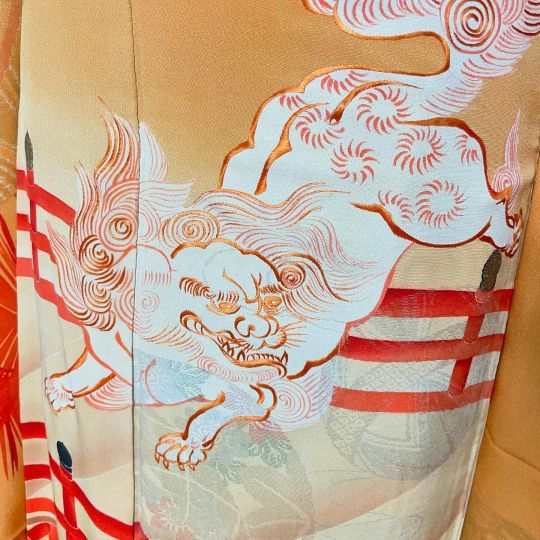






Celebratory outfit perfect for New Year season, featuring an antique kimono depicting shishi (lions) on a bridge - maybe a reference to auspicious play Shakkyô. The beautiful pines nicely frame the main motif, and the temari balls add some whimsy.
Kimono is paired with a romantic obi showing yuki-mochi (snow covered) gosho-guruma (ox cart) and late winter/early spring plants (ume/plum blossom, kiku/chrysanthemum, nandina/heavenly bamboo, suisen/daffodil).
#japan#fashion#kimono#obi#winter in japan#new year#shishi#lion#shakkyo#stone bridge#yuki mochi#ume#plum blossom#kiku#chrysanthemum#nandina#nanten#heavenly bamboo#suisen#daffodil#着物#帯
377 notes
·
View notes
Text

Day 306- November
#november#day 306#reed#topaz#chrysanthemum#birth month#birth flower#birth stone#birth tree#art#dragon#dragon a day#daily dragon#illustration#artists on tumblr
23 notes
·
View notes
Text
i ordered a few fancy mini perfume oils last week after eyeing them for months i am going to smell EXQUISITE
#fresh lilacs + spring rain + late violets + dry stone#candied angelica + chrysanthemum + nardo + jasmine + rice pudding + caramel + golden amber#and moroccan red roses + french vanilla + black raspberry jam#..... O_O
8 notes
·
View notes
Text
I know there's been plenty of changing around of birthstones over the years for multiple reasons (love the post from @reddpenn proposing an entirely new list)
Y'know what I want us to do next? Birth flowers.
Some of 'em are great, sure. Everybody loves roses, violets, chrysanthemums, lilies, etc. But some are kinda plain compared to the rest, like daisies (don't get me wrong, I like daisies but you can't tell me they're in the same tax bracket as peonies) and some aren't even flowers! Looking at you, holly and the red bits of a poinsettia.
(While typing this up I have realized there are at least two lists of flowers, but I think they still need a bit of shaking up)
#is this really just me complaining about the fact that mine are so strongly associated with Christmas?#yeah kinda#but i think everyone else should get a chance to change a flower they don't want too#birth flower#birth stone#birthstone#birthstones#flowers#floral#roses#violets#chrysanthemums#lilies#daisies#peonies#holly#poinsettia
1 note
·
View note
Text









Random PNGs, part 195.
(1. Chrysanthemum stone, 2. Sailfish brooch in silver (1950s), 3. Agate intaglio animal (seahorse?) pendant, 4. Sculpture by Murielle Belin, 5. "Spider stone” from 5000 years ago found in Denmark, 6. Victorian luck chatelaine, 7. Webbed foot of the common frog, 8. Late 19th/Early 20th c. multi-blade penknife, 9. Medieval Ural era bronze plaque with animal heads.)
#png#pngs#transparent#transparents#moodboard#artboard#imageboard#collage#collages#sticker#stickers#mixed media#195
1K notes
·
View notes
Text
𝐒𝐈𝐂𝐊 𝐈𝐍 𝐋𝐎𝐕𝐄

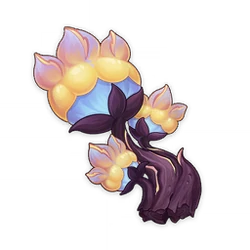



pairing. kinich x fem!reader
word count. 2.1k
genre/warnings. princess!reader, knight!kinich, slight enemies to lovers (not really, they just argue but idk the term for that tbh LOL), pixelprincess!au
summary.
ever since he became your personal guard, you've found kinich to be a royal pain in your ass. you've always assumed he felt the same, until the night of your matching ball. now, you're not sure what this burning in your chest means after all.
author's note. this is a drabble as part of a universe that i'm calling pixelprincess (knight!kinich x princess!reader). i don't really have a full fic planned for this or anything, i just have a bunch of small headcanons about them and i love aus so feel free to scream about them with me HAHA. thank you for reading! reblogs/interaction highly appreciated!
𝐩𝐢𝐱𝐞𝐥𝐩𝐫𝐢𝐧𝐜𝐞𝐬𝐬!𝐚𝐮 𝐦𝐚𝐬𝐭𝐞𝐫𝐥𝐢𝐬𝐭

If there’s one thing you can definitively say about Kinich, it’s that he’s not stupid.
Honestly, you could say a lot of things. You’ve heard the rumors just like everyone else, about the fearsome Captain of the Guard who passed training within a single day. They whisper that he holds a dragon’s power in his heart, a fact that strikes fear into any nation that dares encroach upon your territory. His reputation precedes him, and he’s somewhat of a mystery to the general public—most of them envision him as a hero, the key to the nation’s defense.
If there’s another thing you can definitively say about Kinich, it’s that sometimes, you wish he was stupid.
The castle always feels larger during the summer, when the sunlight bathes the interior with gold and the halls bustle with movement during the day. Guards and aides rush in every direction, though none of them seem to spare a glance in your direction; there’s simply far too much to pay attention to today.
The maids are replacing the vases with fresh flora, Brilliant Chrysanthemums and Saurian Claw Succulents that make the room seem brighter, discussing which configuration looks the best. You know them all, of course; growing up within the castle meant that these women had practically raised you. Even as an adult, it’s hard to escape them when they feel like pinching your cheeks and reminiscing on old times.
Sensing the coast is clear, you crack the door open another millimeter, carefully slipping into the hall and blending in with the crowd. The maids, luckily, don’t notice, still fussing over petals and stems. You’d calculated this time exactly—right now, the guard patrol should be across the castle, checking the entrances before the ball tonight. If your information wasn’t wrong, then you should have just enough time to make it to the servants’ passages, and then out to the garden—
“Oh?”
The familiar voice makes you murmur some choice curse words under your breath. Of course, the dark-haired man in front of you is always several steps ahead of everyone. He’s leaning against the stone wall, looking entirely too pleased with himself, as if he knows something you don’t.
“Princess,” Kinich greets, bowing his head despite how you wave him off—you’ve never been one for formalities. “What are you doing here?”
“Just taking a walk.”
You move at a brisk pace past him, but Kinich is faster—he always is, the annoying bastard. Before you can turn the corner, there’s the blade of a greatsword blocking your path. No matter how much you see it, you’re always surprised by the size of the damn thing—you’re shocked he can even lift it as it is. A half-smirk rests on his lips when you gasp.
“Taking a walk away from your lessons? I do believe your teacher’s room is in the opposite direction.”
The annoying thing about Kinich is that he truly knows everything, including your schedules. He’s thorough to a near fault, though you suppose that that’s exactly the kind of person who would be fit for Captain of the Guard. Still, you duck under his sword, unwilling to make eye contact.
“Lessons are tomorrow. I have other plans today.”
Kinich falls into step beside you, and the halls are suddenly clear of people—the crowd parts before you, a stubborn rock among a rushing river. You’re unsure if it’s due to your status, or due to your temper—it’s a well-known fact in the castle that Kinich can get you wound up quite quickly.
“And what might these other plans be?”
He always has too many damn questions, you think. Silently, you curse your father for assigning him to you. A series of attempts on your life last year had made him paranoid, and he’d been quick to promote the strongest knight as your personal guard. Back then, you’d been fooled just like everyone else into thinking that Kinich was some kind of serious, straight-laced hero. Instead, you’d since discovered that he was seriously annoying.
“Can I guess?” he asks, deftly dodging past the maids carrying bundles of tablecloths and the waiters carrying sky-high stacks of platters.
“No, you can’t. In fact, you can’t even ask. I should have you executed for that.”
Kinich raises a brow, amused. “The Queen would never let that happen.”
And, unfortunately, he’s correct. Your mother absolutely adores Kinich as if he were her own son, and it irritates you to no end—especially when she heavy-handedly suggests that you make him your groom. The door to the back stairwell falls into view, so you break into a jog as you reach the end of the hall, but he’s right on your heel.
If I can just make it to the stairs…
Kinich steps in front of you again, not allowing you an inch further, and you nearly scream in frustration.
“If I didn’t know any better—”
You scoff. “And you, in fact, don’t know anything—”
“—I would say that you’re trying to avoid going to the ball.”
And, once again, you wish that just once Kinich would let something fly over his head.
Utterly defeated, you collapse into one of the plush chairs nearby, fanning your face. Kinich stands over you, a bit tense, as if he thinks you’re going to try to run again. You won’t; at this point, you’re too tired.
“So what if I am?” you finally admit. “You always complain about them anyway. I find it a little unfair that you’re allowed to and I’m not.”
As great as he is at his job as a guard, Kinich isn’t so great at facing the public, despite how popular he is among them (particularly the women). Whenever he can, he avoids social events like the plague, often volunteering to run perimeter duty as a precaution rather than attending with you. You, unfortunately, don’t have that luxury.
Kinich sighs, resting his weight on his sword. “I don’t complain, it’s just annoying when everyone is so loud and—”
You snap your fingers, interrupting and pointing at him accusingly. “You hear that? What you were just doing? That’s called complaining.”
Realizing he was caught in the act, Kinich rolls his eyes. “How very profound of you. If you put that much effort into your escape routes, maybe you would’ve made it this time.”
Your gaze narrows. “How about I stick a profound fist up your a—”
“Kinich? Is that you?”
The booming voice makes you both straighten up instantly. Kinich smoothly sheaths his sword, saluting to the king as he makes his way down the hall. You’re far less graceful about it, gathering up your skirts messily and quickly curtseying to your father.
“Your Highness,” you both echo.
If your father notices the tension between the two of you, he doesn’t say so; he looks as jolly as always, even more so because of the event today. He’s the social type, a trait you unfortunately did not inherit.
“Just the two people I was hoping to see,” he laughs, a full-bodied sound that booms from his chest. “I’m glad that the two of you get along so well.”
To your irritation, Kinich smirks, while you offer your father a thin-lipped smile.
“Of course,” you lie, sneakily jabbing your guard in the ribs. He coughs. “We get along like a house on fire.”
“That’s good,” your father says, nodding encouragingly. “You’ll both do well later tonight then.”
Your heart drops at the thought of attending the event. You know how long your parents have been planning this, and how long they’ve been practically begging you to find a companion. It’s all a long-winded scheme to find you a princely partner, and not one that you particularly appreciate—a great majority of the princes you’ve met are far too full of themselves. You truly have no interest in any of them.
Kinich, however, pointedly clears his throat at your father’s wording.
“Both of us?” he asks, enunciating slowly. “I’m not sure I follow, sir.”
You perk up in interest—that detail had been lost on you.
“I invited several princes from neighboring nations today,” your father says, eyeing you with a pitying stare. You try not to feel offended. “I want my daughter to find someone suitable for her, no matter who that may be. Still, I was hoping you could attend with her this time? I know it’s not your favorite, but I would feel uncomfortable with her being around so many strangers alone.”
Kinich’s smirk falters, and he suddenly falls still. You wonder if he’s irritated by the prospect of attending the ball at your side.
(Distantly, you wonder why the thought of that makes you feel a bit ill.)
The silence grows awkward, and you rock on your heels, searching for something to say. Your guard looks a bit lost for words, likely because he wasn’t prepared for so much social interaction today. You can’t really blame him—if you were in his shoes, you wouldn’t be thrilled either.
“Actually, Your Highness, that won’t be necessary.”
Your eyes nearly pop out of your skull at Kinich’s reply, but you hurry to control your expression, unwilling to give anything away to your father. The king raises a brow.
“And why is that?” he asks.
Kinich gnaws on his lip, an action that is wholly unlike him—you don’t think you’ve ever seen him appear nervous about anything in his life. Still, he meets your father’s gaze head on, coughs once, then says:
“The princess isn’t feeling well. I think it’d be best if she didn’t attend the ball today.”
He nudges your foot just as your father’s gaze drifts to you, and you thank your lucky stars that you did inherit your mother’s dramatics. You throw a hand over your forehead, fanning yourself aggressively.
“Since this morning,” you explain, looking as pitiful as possible, “I don’t know what’s wrong with me. Thank the archons Kinich was here, otherwise I might’ve fainted earlier.”
And you really do feel guilty when your father’s eyes well up with tears of worry.
“Why didn’t you tell me earlier?” he cries, then turns to one of his aides in a panic. “Call the doctor! Have him attend to her immediately. And announce that she’ll be absent from our festivities tonight.”
You force yourself to hide your smile at his announcement. Your eyes flicker over to Kinich, but for once, he doesn’t seem the slightest bit amused—in fact, he still looks troubled. Your father fusses over you for a bit longer, asking a series of questions about what you’d eaten and who you’d been in contact with. You answer as honestly as you can—the least you can do—and then he directs Kinich to escort you back to your room.
The hallway seems to empty out quickly after that display, and then it’s just you and your guard. For some reason, he seems to avoid your eyes. He doesn’t speak, merely offering you his arm, and after a moment, you take it.
“So, what changed your mind?” you ask, unwilling to let him sit in silence. He looks displeased by your question, but answers anyway.
“Nothing,” he says, expression blank, “I just didn’t think you should go to the ball tonight.”
The tips of his ears are flushed red, you note. Liar.
Still, Kinich keeps countless secrets that you’re sure you’ll never know, and you suppose it doesn’t really matter why he decided to let you off the hook tonight. Really, you’re just grateful you’ll get to sleep peacefully with no stinking princes breathing down your neck. The thought makes you smile as you finally reach your bedroom door.
“Well, what a shame it is,” you sigh sarcastically, turning the knob, “I could’ve been dancing the night away with the love of my life. Now I might never meet him.”
The corner of Kinich’s lip twitches.
“As if,” he replies gruffly, a touch too fast. “You wouldn’t like any of them anyway. They’re not nearly capable of handling you.”
Your eyes narrow, irritated by the implication. “And you are?”
He raises a brow in response. “Aren’t I?”
It comes out uncharacteristically soft. A switch seems to flip in the room, and you suddenly start feeling sick for real—it’s too hot, too quiet. Kinich’s stare weighs on you heavily, and you get lost in the depth of it. You freeze where you are, bedroom door half-open, and you can almost pick out the meaning in his words when he turns away, clearing his throat.
“Goodnight, princess,” he murmurs over his shoulder. “Sweet dreams, and…get well soon.”
He makes his exit without another word, and you wonder if he’s still working tonight. Is he still going to guard the ball? The perimeter? What if one of the other princesses takes a liking to him—
You huff, deciding you don’t care and slamming the door shut. The ball is bound to be a drag, and you find Kinich annoying, you think as you fall into bed. You’re happy about this arrangement. Overjoyed, even.
Yes, you find Kinich very annoying.
…Don’t you?
#genshin impact x reader#kinich x reader#genshin x reader#genshin impact imagines#genshin impact fluff#kinich x you#kinich#genshin impact#adeptus ink#pixelprincess!au
894 notes
·
View notes
Text
Meet once more
W: angst, character death, depression, happy ending, cursing. (Tell me if I missed any)
Summary: where a garden can change his good heart

Wc: 5.5k
The Heian era was a time of beauty and blood, where curses and sorcerers danced in an endless battle for dominance. Above the plains, high on an isolated mountain, lay the dark kingdom of Ryomen Sukuna, the King of Curses. His name was etched into history with fear and hatred, his four arms wielding death and destruction wherever he went. For all his strength and glory, Sukuna lived in solitude, his vast estate echoing with the silence of the dead.
His palace, a masterpiece of architecture, was shadowed by towering stone walls and intricate wooden beams. Yet, despite its magnificence, it was a tomb. No laughter, no warmth—only the howling wind and the occasional groan of old wood filled its halls. His servants were few and silent, bound to him by fear rather than loyalty.
But there was one place in his domain that thrived: his garden. It was a stark contrast to the desolation surrounding him, a lush, vibrant sanctuary filled with rare and beautiful flowers. Sukuna himself had overseen its creation, though he never allowed anyone to enter it. The garden was his alone, a quiet reminder of beauty in a world he despised.
It was this sacred space that she stumbled into one warm spring morning.
Sukuna was making his usual rounds, his steps slow and deliberate as he moved through the winding paths of his garden. The wisteria trees were in full bloom, their purple petals cascading like waterfalls. The air was fragrant and still. But as he turned a corner, he stopped.
There she was—a woman crouched among the flowers, her hands busy weaving together stems of wild daisies and chrysanthemums into a small bouquet. She was humming softly to herself, completely oblivious to the danger she was in. The sight was so unexpected, so absurd, that for a moment, Sukuna simply watched her.
Her presence disrupted the sanctity of his garden. The stillness he had cultivated for centuries was broken by the gentle melody of her voice and the rustle of leaves beneath her fingers. Fury bubbled within him, and he took a single step forward.
The sound of his footfall broke her trance. She froze, her hand halfway to her basket, before turning her head to look at him. Her eyes met his, and in an instant, her expression shifted from peaceful contentment to wide-eyed fear. She scrambled to her feet, the basket tumbling to the ground and spilling its contents.
Sukuna towered over her, his crimson eyes glinting like polished rubies in the dappled sunlight. “What do you think you’re doing?” he growled, his voice low and dangerous.
“I—” Her voice faltered, but she swallowed hard and tried again. “I didn’t know anyone lived here.”
He stepped closer, his towering frame casting a long shadow over her. “You think that excuses your trespass? My garden is not a place for petty thieves.”
Her brows knitted together, and she shook her head quickly. “I’m not a thief! I didn’t know this was yours. I just… the flowers were so beautiful. I couldn’t help myself.”
Sukuna’s lip curled in disdain. He expected her to beg for forgiveness, to drop to her knees and plead for her life. Yet, while her fear was palpable, there was no groveling. Instead, she stood before him, trembling but defiant, her hands clenched tightly at her sides.
“You’re either incredibly brave or hopelessly stupid,” Sukuna sneered.
“I—” She hesitated, then straightened her back, forcing herself to meet his piercing gaze. “I meant no harm.”
He stared at her for a long moment, the silence between them stretching until it was nearly unbearable. Then, with a sharp flick of his clawed hand, he pointed toward the path leading out of the garden. “Leave. If I ever see you here again, I will not spare you.”
She didn’t need to be told twice. Grabbing her empty basket, she bowed her head quickly and fled down the path, her footsteps fading into the distance.
But she returned the very next day.
Sukuna had been expecting her. He had felt her presence as soon as she stepped into the garden, the faint hum of her aura a disruption he could no longer ignore. When he found her, she was kneeling in the same spot, carefully replanting a flower she had accidentally uprooted the day before.
His anger flared as he approached her, his footsteps heavy against the soft earth. “Are you trying to die, woman?”
She startled, looking up at him with wide eyes. For a moment, she hesitated, as though debating whether to flee. But then she squared her shoulders and met his gaze. “I… I thought it was the least I could do to make up for yesterday. I’m sorry if I caused any damage.”
Her quiet apology gave him pause. Most would have run at the mere sound of his voice, yet she faced him with trembling hands and a determined expression. “You’re an idiot,” Sukuna muttered, his crimson eyes narrowing.
“Maybe,” she admitted with a faint, nervous smile. “But I couldn’t leave it like this.”
Against his better judgment, Sukuna allowed her to stay.
Day after day, she returned. Each time, she brought a sense of life to the garden that had been missing for centuries. Her hands worked tirelessly to prune, weed, and water the plants, her soft humming filling the once-silent air. Sukuna found himself watching her from the shadows, his sharp eyes tracking her every movement. He told himself it was to ensure she wasn’t causing any damage, but deep down, he knew that wasn’t the truth.
She intrigued him.
Weeks turned into months, and her presence became a constant in Sukuna’s life. She spoke to him occasionally, her voice light and unassuming, as though she were unaware of the weight of his gaze. At first, he ignored her, offering only curt replies or silence in return. But slowly, without realizing it, he began to respond.
One evening, as the sun dipped low on the horizon, casting the garden in hues of gold and pink, she sat beneath a cherry blossom tree, her back resting against the trunk. Petals rained down around her, catching in her hair. Sukuna approached her, his footsteps soft against the grass.
“Why do you keep coming back?” he asked, his voice breaking the quiet.
She looked up at him, her eyes thoughtful. “Because the garden needs care,” she said simply. “And… I think you do too.”
Her words struck a chord deep within him, one he had long thought dead. Sukuna stared at her, his crimson eyes searching hers for any hint of mockery, but all he found was sincerity.
“You’re a strange woman,” he muttered, sitting down beside her.
Her smile was soft and genuine. “And you’re not as scary as everyone says you are.”
For the first time in centuries, Sukuna felt something stir in his chest—a warmth he had almost forgotten.
The days stretched into weeks, and their strange companionship deepened. Sukuna found himself lingering in the garden more often, his usual patrols of the mountain becoming an afterthought. She was there, her presence as natural as the flowers she tended, her hands bringing life to every corner of his once-forgotten sanctuary.
He had never been one for small talk, yet he found himself listening when she spoke. She talked about simple things—how the cherry blossoms were blooming earlier this year, how a rare species of orchid needed extra care. Sometimes she would ramble about her village, her family, or her childhood, her words painting a life so ordinary it was almost foreign to Sukuna. He listened, silently absorbing the details, though he rarely offered much in return.
But even he couldn’t ignore the way her laughter softened the edges of his harsh world, or how her smile seemed to brighten the very air around them. She was a disruption, a flicker of light in the darkness he had wrapped himself in for centuries.
One day, as the afternoon sun bathed the garden in golden light, she looked up from her work and asked, “Why did you make this garden?”
Sukuna was leaning against a tree, his arms crossed over his chest, watching her with his usual intensity. Her question caught him off guard. He had never told anyone the reason, never felt the need to explain himself. But something about the way she looked at him—curious, but never prying—made him pause.
“It reminded me that even in chaos, there’s order,” he said finally, his voice low. “That even in destruction, something can still grow.”
She tilted her head, her hands stilling as she considered his words. “That’s beautiful,” she said softly.
Sukuna scoffed, though there was no malice in it. “It’s practical. Nothing more.”
But her gentle smile told him she didn’t believe him.
The change in their dynamic was gradual. At first, Sukuna told himself it was her usefulness that kept her around. The garden had never looked more vibrant, and her care was unparalleled. But as time went on, he found himself seeking her out not for the garden, but for her presence.
She began to ask him questions—questions about his life, his powers, his reign. At first, he dismissed her curiosity with sharp remarks, but her persistence wore him down. He told her stories of the battles he had fought, the kingdoms he had razed, and the sorcerers who had dared challenge him. She listened intently, her eyes wide with a mix of awe and sadness.
“You’ve been alone for a long time,” she said one evening, her voice barely above a whisper.
Sukuna didn’t respond immediately. Instead, he looked out at the horizon, where the sun was setting behind the mountains. “Alone is safer,” he said finally.
“Safer doesn’t mean better,” she replied, her words hanging in the air between them.
He didn’t have an answer for that.
The turning point came one quiet night under the stars. The garden was bathed in silver moonlight, the soft chirping of crickets filling the silence. She sat beside him near the koi pond, her knees tucked to her chest as she stared at the water.
“I think I’ve fallen in love with this place,” she said softly, breaking the quiet.
Sukuna’s gaze flicked to her, his expression unreadable. “It’s just a garden.”
“No,” she said, shaking her head. “It’s more than that. It’s… peaceful. It feels alive, even though everything else feels so uncertain.”
There was a pause, and then she turned to him, her eyes meeting his. “I think I’ve fallen in love with you, too.”
Her words stunned him. For a moment, he couldn’t speak, his crimson eyes locked on hers. No one had ever said such a thing to him—not with sincerity, not without fear. His first instinct was to dismiss it, to tell her she was foolish. But the look in her eyes silenced him.
“You don’t know what you’re saying,” he said finally, his voice rough.
“I do,” she insisted. “I know exactly what I’m saying. I see you, Sukuna. I see the man behind the power, behind the fear. And I don’t care about what others say. I care about you.”
Her words cut through the walls he had built around himself, leaving him exposed in a way he hadn’t been in centuries. Slowly, he reached out, his clawed hand brushing against her cheek. She didn’t flinch, didn’t pull away. Instead, she leaned into his touch, her eyes never leaving his.
“You’re a strange woman,” he murmured, his voice softer than it had ever been.
“And you’re a complicated man,” she replied with a small smile.
For the first time in centuries, Sukuna allowed himself to feel something other than anger and emptiness. He allowed himself to care.
Their love grew like the garden—slowly, patiently, but undeniably. Sukuna found himself smiling more, his sharp edges softened by her presence. She brought warmth to his cold world, filling the empty halls of his estate with laughter and life. They married in a quiet ceremony under the cherry blossoms, with no witnesses but the flowers and the wind.
For a time, they were happy. Sukuna began to believe that perhaps he could have something good, something pure, in a world that had always been cruel.
But fate was not so kind.
The sorcerers came without warning, their spells shattering the peace of the mountain. They sought to destroy Sukuna, to end the reign of the King of Curses once and for all. In the chaos, they captured her, dragging her from the garden as she screamed his name.
Sukuna fought with a rage unlike anything the world had ever seen. His power tore through the sorcerers like a storm, their bodies falling like leaves in the wind. But when he reached her, it was too late.
She lay on the ground, her body broken, blood pooling beneath her.
“No,” Sukuna whispered, dropping to his knees beside her. His hands trembled as he cradled her face, his crimson eyes wide with disbelief. “No, this isn’t happening.”
Her eyes fluttered open, her gaze weak but full of love. “I’m sorry,” she whispered, her voice barely audible.
“Don’t you dare,” Sukuna growled, his voice breaking. “Don’t you dare leave me.”
“I love you,” she murmured, her hand reaching for his cheek.
Before he could respond, her hand fell limp, and her eyes closed.
Sukuna’s roar of grief echoed through the mountains, his tears falling freely as he held her lifeless body in his arms.
Centuries passed, and the once-grand estate crumbled into ruins. The garden withered without her care, its beauty lost to time. Sukuna withdrew from the world, his heart hardened into stone. He stayed atop the mountain, a shadow of the king he once was, his mind haunted by memories of her.
The modern world grew around him, but he paid it no mind. Centuries passed, and the world moved on without him. The mighty King of Curses, once feared and revered, became little more than a myth whispered in forgotten tales. Sukuna no longer cared about power or dominance; even hatred had turned to numbness. His estate, once a palace fit for a god, had withered into nothing but a broken skeleton of its former grandeur. Stone walls crumbled, roofs caved in, and the lush, vibrant garden that once symbolized life had long since withered into decay.
Sukuna sat atop the hill in solitude, a silent monument to what he had lost. The days blurred into each other, the passing of time irrelevant to an immortal being. The world at his feet changed, skyscrapers rising like great mountains of steel and glass, cars roaring like beasts on paved roads. Yet his world remained frozen, locked in the moment her life had slipped from his hands.
He no longer wandered through the ruins of his garden; the sight of the overgrown weeds and the broken koi pond was unbearable. Instead, he sat in the shadow of the mountain, a lone figure in a shack that had become more of a cage than a home. The nights stretched endlessly, his mind looping through memories that refused to fade.
Then she came.
It was early spring, and the air was cool and crisp as Sukuna rested against the doorframe of his shack, his gaze distant as he stared at the valley below. The first thing he felt was a faint ripple in the air, an energy so familiar that it stopped him in his tracks. He thought he was imagining it, that his mind was playing cruel tricks on him again. But then he heard the soft crunch of footsteps on the gravel path.
She appeared suddenly, rounding the bend where the old garden gate used to stand. She didn’t look out of place—dressed casually in a light jacket, jeans, and hiking boots, her hands tucked into her pockets. She wasn’t supposed to be there; people rarely ventured this far up the mountain anymore.
Sukuna’s breath hitched in his chest. It wasn’t just that she looked like her; it was that she felt like her. The aura she carried, that undeniable warmth, was the same. His sharp crimson eyes drank in every detail—the curve of her face, the soft glint of curiosity in her eyes as she glanced around the ruins. It was her. Reincarnated, but undeniably her.
She hadn’t seen him yet, too focused on taking in her surroundings. She knelt to touch the weathered stones of what had once been a garden wall, brushing away moss with her fingers. “It’s beautiful, even like this,” she murmured, her voice barely above a whisper.
Her voice struck Sukuna like a thunderclap. It was different, yet the cadence was the same, the softness that had once soothed him now filling him with a tempest of emotions. His hands clenched into fists, his nails digging into his palms as he fought to keep himself from rushing to her. How could this be possible? How could she stand here, centuries later, as if fate had finally returned her to him?
Finally, she noticed him. Her head turned, her eyes widening slightly as they locked onto his figure. He stood still, his towering frame half-hidden in the shadow of the doorway. For a moment, neither of them spoke.
“Oh,” she said, blinking. “I didn’t realize anyone lived up here.”
Sukuna’s voice, rough from centuries of disuse, came out like a low growl. “Who are you?”
Her surprise turned to slight embarrassment. “I’m… just exploring. I’ve heard about this place before, but I didn’t think I’d actually find it.” She gave a small, apologetic smile. “Sorry if I’m intruding. I can leave if you want.”
He stepped forward, his crimson eyes narrowing as he took in every nuance of her expression. Her mannerisms were different, more modern, but there was no mistaking her. It was her soul standing before him. “You shouldn’t be here,” he said gruffly.
Her brows furrowed slightly, her gaze flicking between him and the ruins around them. “I didn’t mean any harm. I just thought… this place feels special. Like it has a story to tell.”
His jaw tightened. A story. If she only knew.
She hesitated, her hand brushing over the vines that had overtaken the garden walls. “I know it’s run down now, but… it’s still beautiful in its own way. I can’t explain it, but it feels like this place is waiting for something. Or someone.”
Sukuna felt the weight of her words like a blade to his chest. He wanted to tell her everything—that this place was waiting for her, that he had been waiting for her. But instead, he swallowed the words, masking his emotions behind a cold exterior.
“The garden is dead,” he said flatly.
Her lips pressed together thoughtfully as she looked around. “It doesn’t have to be. Gardens can come back to life if someone takes care of them.” She smiled softly. “I’m good with gardens.”
Sukuna’s chest tightened. It was almost too much—the way she stood there, so full of life, speaking as though she were meant to be here. He clenched his fists, his sharp nails biting into his palms. “You think you can fix this place?” he asked, his tone colder than he intended.
She tilted her head, unbothered by his harshness. “Maybe. It would take some work, but I’d love to try.”
He stared at her, his mind a whirlwind of conflicting emotions. Was this fate’s cruel joke, dangling her before him only to take her away again? Or was this his second chance?
Finally, he said, “The garden is beyond saving. But if you’re foolish enough to try, I won’t stop you.”
Her smile brightened, and for a moment, the world seemed a little less gray. “I’ll do my best,” she said, her voice full of determination.
As she turned to examine the overgrown garden, Sukuna watched her silently, his heart aching with a mixture of hope and fear. He had spent centuries in darkness, his grief carving him into something colder, harsher than even he had been before. But now, standing before him was a piece of the light he thought he had lost forever.
He would find reasons to keep her here, excuses to bring her back. He couldn’t lose her again. Not this time.
#fanfic#jjk requests#jujutsu kaisen#requests are open#sfw#fluffy#jjk fluff#jjk x reader#jjk x you#nanami fluff#sukuna x y/n#sukuna x you#sukuna x reader#sukuna ryomen x reader#sukuna ryomen x you#jjk men x reader#Gojo x reader#Geto x reader#choso x reader#Nanami x reader#Toji x reader#megumi x reader#yuji x reader#x reader#x you
210 notes
·
View notes
Text
October 2024 Witch Guide
New Moon: October 2nd
First Quarter: October 10th
Full moon: October 17th
Last Quarter: October 24th
Sabbats: Samhain- October 31st-November 1st
October Hunter's Moon
Also known as: Blood Moon, Drying Rice Moon, Falling leaf Moon, Freezing Moon, Harvest Moon, Migration Moon, Moon of the Changing Season, Sanguine Moon,, Shedding Moon, Ten Colds Moon, Winterfelleth & Windermanoth
Element: Air
Zodiac: Libra & Scorpio
Nature spirts: Frost Faeries & Plant Faeries
Deities: Apollo, Astarte, Belili, Cernunnos, Demeter, Hathor, Herne, Horned God, Ishtar, Lakshmi & Mercury
Animals: Elephant, jackal, ram, scorpion & stag
Birds: Crow, heron & robin
Trees: Acacia,apple, cypress & yew
Herbs: Angelica, burdock, catnip, pennyroyal, sweet Annie, thyme & uva ursi
Flowers: Apple blossom, calendula, cosmos & marigold
Scents: Apple blossom, cherry & strawberry
Stones: Amethyst, beryl, cat's eye, chrysoberyl, citrine, obsidian, opal, sapphire, tourmaline & turquoise
Colors: Black, blue, dark blue, blue-green & purple
Issues, intentions & powers: Cooperation, darkness, divination, healing & hope
Energy: Artistic works, creativity, harmony, inner cleansing, justice, karma, legal matters, mental stimulation, partnerships, reincarnation & uncovering mysteries or secrets
The Harvest Moon is the full Moon that occurs nearest to the autumnal equinox date (September 22, 2024). This means that either September or October’s full Moon may take on the name “Harvest Moon” instead of its traditional name. Similarly, the Hunter’s Moon is the first full Moon to follow the Harvest Moon, meaning it can occur in either October or November.
The Harvest Moon & the Hunter’s Moon are unique in that they are not directly related to this folklore or restricted to a single month. Instead, they are tied to an astronomical event: the autumnal equinox!
• October’s full Hunter Moon orbits closer to Earth than any of the other full Moons this year, making one of the four supermoons of 2024! As the Moon drifts over the horizon around sunset, it may appear larger & more orange—how perfect for the fall season!
It is believed that this name originates from the fact that it was a signal for hunters to prepare for the upcoming cold winter by going hunting. This is because animals were beginning to fatten up in preparation for the winter season. Moreover, since fields had recently been cleared out under the Harvest Moon, hunters could easily spot deer & other animals that had come out to search for remaining scraps. Additionally, foxes & wolves would also come out to prey on these animals.
Samhain
Known as: Ancestor's night, Feast of Apples, Feast of Sam-fuim, Feast of Souls, Feast of the Dead, Geimhreadh, Hallowmass, Martinmass, Old Hallowmass, Pagan New Year, Samana, Samhuinn, Samonios & Shadowfest
Season: Autumn
Element: Water
Symbols: Apples, bats, besom, black cats, cauldrons, ghosts, gourds, jack-o-lanterns, pumpkins, scarecrows & witches
Colors: Black, gold, orange, silver & white
Oils/Incense: Basil, cloves, copal, frankincense, gum mastic, heather, heliotrope, mint, myrrh & nutmeg
Animals: Bat, bear, boar, cat, cattle & dog
Stones: Amber, anatase, black calcite, black obsidian, black tourmaline, bras, carnelian, clear quartz, diamond, garnet, gold, granite, hematite, iron, jet, marble, onyx, pearl, pyrite, ruby, sandstone, sardonyx, smokey quartz, steel & tektite
Food: Apples, ale, beef, cider, corn, nuts, fruit, garlic, gourds, grains, hazelnuts, herbal teas, mushroom, nettle, nuts, pears, pomegranates, pork, poultry, pumpkin pie, sunflower seeds, thistle, turnips & wine (mulled)
Herbs/Plants: Acorn, allspice, angelica, besom, catnip, corn, deadly nightshades, dittany of Crete, fumitory, garlic, mandrake, mugwort, mullein, oak leaves, patchouli, reed, rosemary, rue, sage, straw, tarragon, thistle & wormwood
Flowers: Calendula, chrysanthemum & heather
Trees: Apple, beech, buckthorn, hazel, pine, locust, pomegranate, willow, witch hazel, yellow cedar & yew
Magical: Faeries
Goddesses: Al-Lat, Baba Yaga, Badb, Bast, Bebhionn, Bronach, Brunhilde, Cailleach, Carlin, Cassandra, Cerridwen, Copper Woman, Crobh Dearg, Devanyani, Dolya, Edda, Elli, Eris, Erishkigal, Fortuna, Frau Holde, Hecate, Hel, Mania, The Morrigan, Nemisis & Nicneven
Gods: Arawn, Baron Samede, Chronus,The Dagda, Dis, Hades, Nefertum, Osiris, Pluto, Woden & Xocatl
Spellwork: Divination, fire magick, night magick, shape-shifting, spirit calling & water magick
Issues, Intentions & Powers: Crossroads, darkness, death, divination, honor, introspection, otherworldly/underworld, release, visions & wisdom
Activities:
•Dedicate an altar to loved ones who have passed
• Boil a simmer pot to cleanse your space
• Have a silent dinner
• Light a candle for your loved ones & yourself
• Decorate your house and/or altar
• Release negative energy & cleanse yourself with a ritual bath
• Pull tarot cards to see what may be in store for you ahead
• Cleanse, clean & de-clutter your space
• Host or attend a bonfire
• Leave offerings for the Sídhe
• Journal & reflect on your accomplishments, challenges & everything you did this year
•Go on a nature walk
• Learn a new form of divination
• Have a bonfire with your friends and/or family
• Carve pumpkins, turnips or apples
• Express yourself creatively through art, music, ect
• Visit a cemetery & help clean off areas that need it or to visit a family member/ ancestor & leave an offering
• Hold a seance
• Bake spooky treats & bread as offerings
• Refresh your protection magicks, sigils & rituals
Samhain is about halfway between the autumnal equinox & winter solstice. It is one of the four Gaelic seasonal festivals along with Imbolc, Beltane, & Lughnasa. Historically it was widely observed throughout Ireland, Scotland, & the Isle of Man.
Samhain is believed to have Celtic pagan origins & some Neolithic passage tombs in Great Britain & Ireland are aligned with the sunrise at the time of Samhain. It is mentioned in the earliest Irish literature, from the 9th century & is associated with many important events in Irish mythology.
The early literature says great gatherings & feasts marked Samhain when the ancient burial mounds were open, which were seen as portals to the Otherworld. Some of the literature also associates Samhain with bonfires & sacrifices.
• According to Irish mythology, Samhain (like Beltane) was a time when the 'doorways' to the Otherworld opened, allowing supernatural beings and the souls of the dead to come into our world; while Beltane was a summer festival for the living, Samhain "was essentially a festival for the dead".
•The festival was not recorded in detail until the early modern era. It was when cattle were brought down from the summer pastures & livestock were slaughtered. Special bonfires were lit, which were deemed to have protective & cleansing powers.
At Samhain, the aos sí were appeased with offerings of food & drink to ensure the people & livestock survived the winter. The souls of dead kin were also thought to revisit their homes seeking hospitality & a place was set at the table for them during a meal. Divination was also a big part of the festival & often involved nuts & apples.
Mumming & guising were part of the festival from at least the early modern era, whereby people went door-to-door in costume, reciting verses in exchange for food. The costumes may have been a way of imitating & disguising oneself from the aos sí.
• In the late 19th century, John Rhys and James Frazer suggested it had been the "Celtic New Year", but that is disputed.
Some believe it is the time of The Goddess' mourning the death of The God until his rebirth at Yule. The Goddess' sadness can be seen in the shortening, darkening days & the arrival or cold weather.
Related festivals:
• Halloween( October 31st)-
In popular culture, the day has become a celebration of horror, being associated with the macabre and supernatural.
•One theory holds that many Halloween traditions were influenced by Celtic harvest festivals, particularly the Gaelic festival Samhain, which are believed to have pagan roots. Some go further & suggest that Samhain may have been Christianized as All Hallow's Day, along with its eve, by the early Church. Other academics believe Halloween began solely as a Christian holiday, being the vigil of All Hallow's Day.
Popular Halloween activities include trick-or-treating (or the related guising & ghouling), attending Halloween costume parties, carving pumpkins or turnips into jack-o'-lanterns, lighting bonfires, apple bobbing, divination games, playing pranks, visiting haunted attractions, telling scary stories, & watching horror or Halloween-themed films
• Day of the Dead(November 1st-2nd)-
el Día de Muertos or el Día de los Muertos
The multi-day holiday involves family & friends gathering to pay respects & to remember friends & family members who have died. These celebrations can take a humorous tone, as celebrants remember amusing events & anecdotes about the departed. It is widely observed in Mexico, where it largely developed, and is also observed in other places, especially by people of Mexican heritage.
•The observance falls during the Christian period of Allhallowtide.
Traditions connected with the holiday include honoring the deceased using calaveras & marigold flowers known as cempazúchitl, building home altars called ofrendas with the favorite foods & beverages of the departed & visiting graves with these items as gifts for the deceased.
The celebration is not solely focused on the dead, as it is also common to give gifts to friends such as candy sugar skulls, to share traditional pan de muerto with family & friends, & to write light-hearted & often irreverent verses in the form of mock epitaphs dedicated to living friends & acquaintances, a literary form known as calaveras literarias.
Some argue that there are Indigenous Mexican or ancient Aztec influences that account for the custom & it has become a way to remember those forebears of Mexican culture.
• All Saint's Day(November 1st)-
Also known as All Hallows' Day or the Feast of All Saints is a Christian solemnity celebrated in honour of all the saints of the Church, whether they are known or unknown.
Sources:
Farmersalmanac .com
Llewellyn's Complete Book of Correspondences by Sandra Kines
Wikipedia
A Witch's Book of Correspondences by Viktorija Briggs
Encyclopedia britannica
Llewellyn 2024 magical almanac Practical magic for everyday living
#samhain#witchblr#wiccablr#paganblr#witch community#witchcore#witchcraft#witches of tumblr#Autumn#fall#wheel of the year#hunters moon#sabbat#October#October 2024#witch guide#witch tips#grimoire#book of shadows#baby witch#beginner witch#traditional witchcraft#Greenwitchcrafts#witchy stuff#witchythings#witch friends#witch#witchessociety#full moon#spellwork
368 notes
·
View notes
Text
April 13, Xi'an, China, Shaanxi Archaeology Museum/陕西考古博物馆 (Part 5 - Tang dynasty, Song dynasty, and later):
Happy Mid-Autumn to everyone!
First up is again an undisputed star of the museum, the gold crown of Li Zhui/李倕. Li Zhui was the 5th generation descendant of Li Yuan/李渊, aka Emperor Gaozong of Tang, the first emperor of Tang dynasty (618 - 907 AD). It's speculated that this crown was what the Tang-era term "轻金冠" (lit. "light gold crown") was referring to. The crown itself wasn't just gold, however, it also had parts of silver, copper, and iron, decorated with pearls, mother of pearl, agate, turquoise, rubies, amber, ivory, and glass.
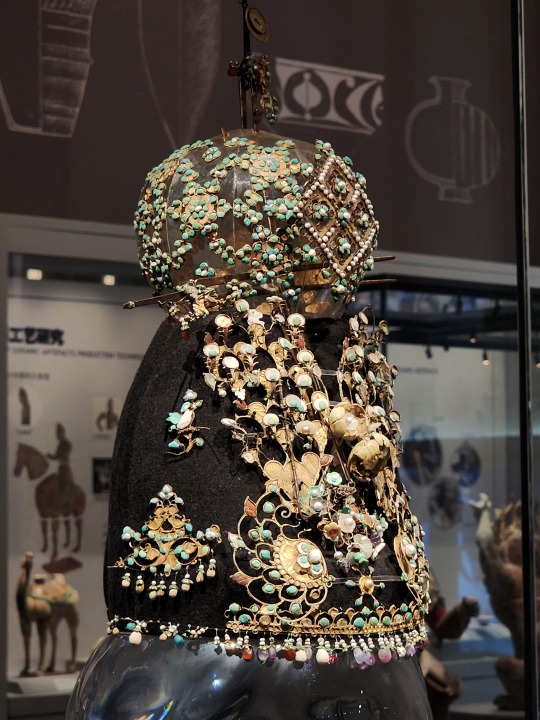
And it wasn't just a crown either. There were other pieces that were part of her outfit:
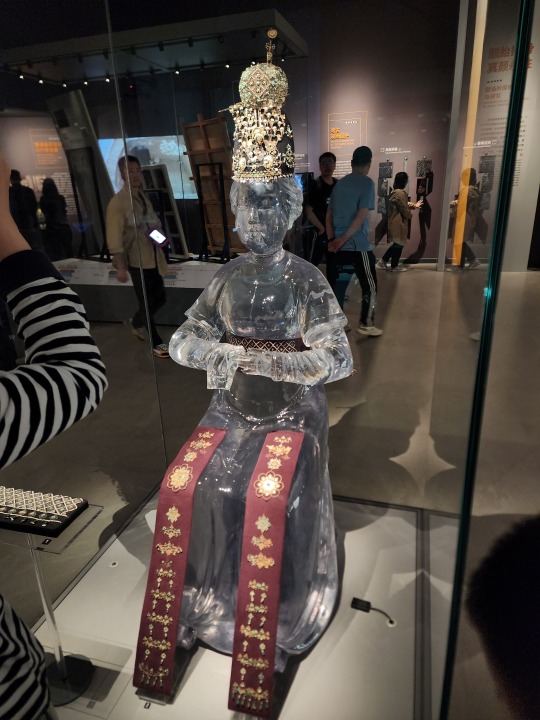
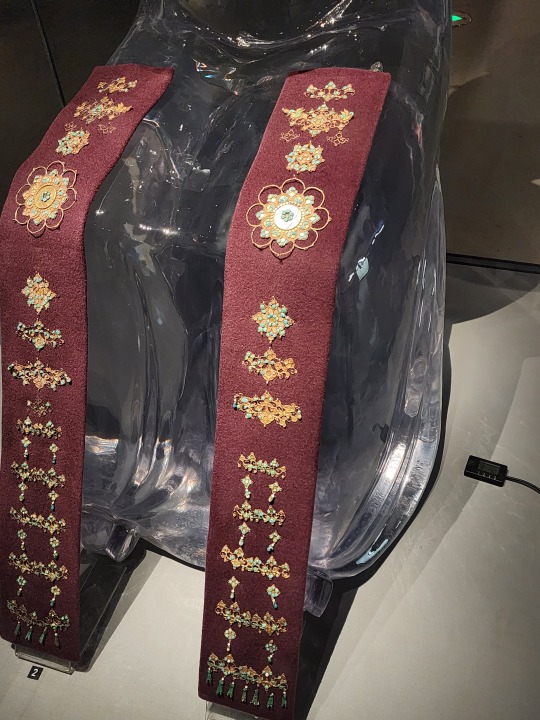
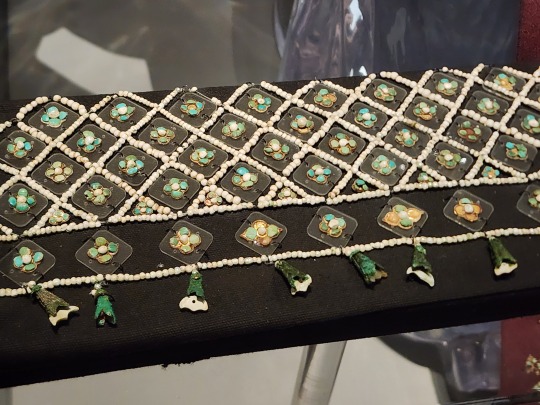
Various Tang-era gold and silver thread embroidery pieces found in the crypt of Famen Temple/法门寺, the plaque is visible in many of these so I won't be naming them all. There's a saying among Chinese archaeologists: "dry things last a thousand years, wet things last ten-thousand years, half-wet half-dry things last half a year" ("干千年,湿万年,不干不湿就半年"). This refers to the conditions the artifacts/remains were in over time, stable conditions usually preserve artifacts and remains better than changing conditions. Fabric-based artifacts are notoriously hard to preserve, especially in Xi'an's "half-wet half-dry" climate, so these are a rare sight:
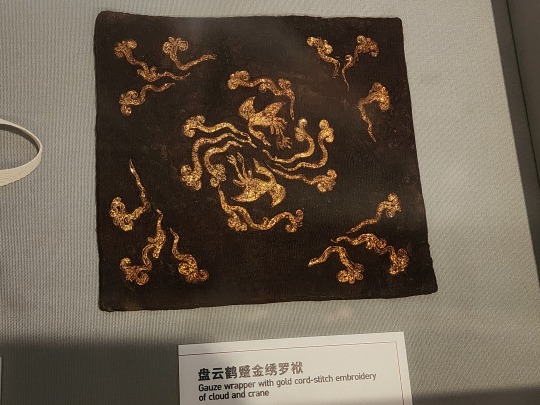
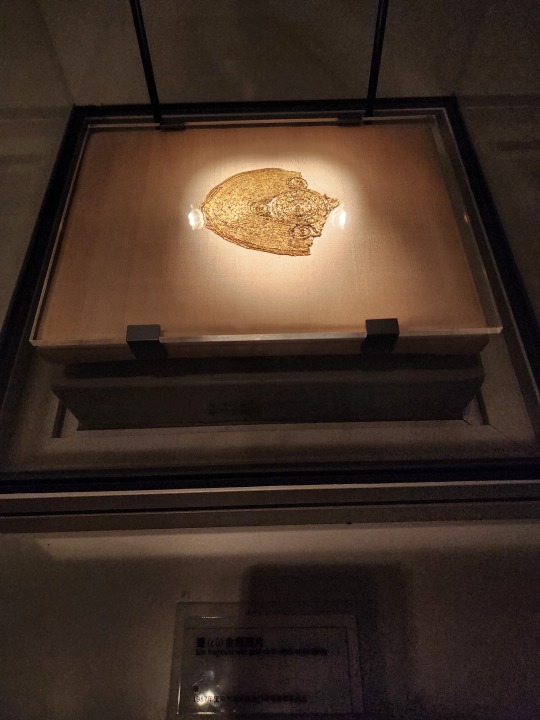
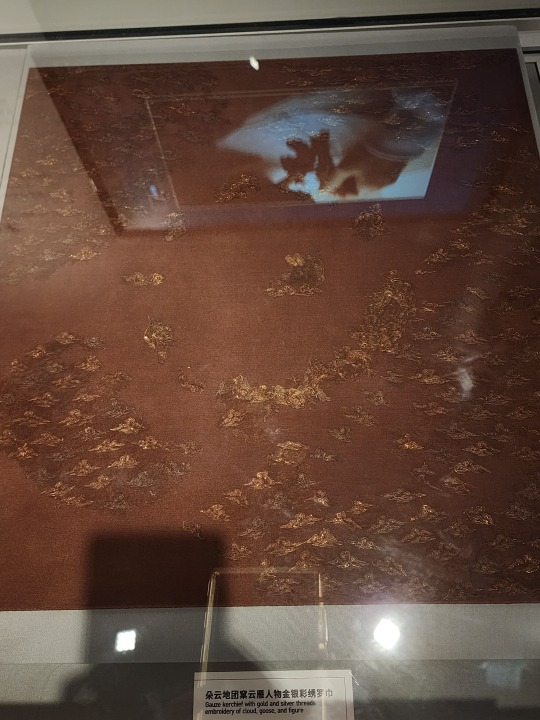
Note that the bird and flower design on the right is actually not an embroidery, but designs woven straight into the fabric:
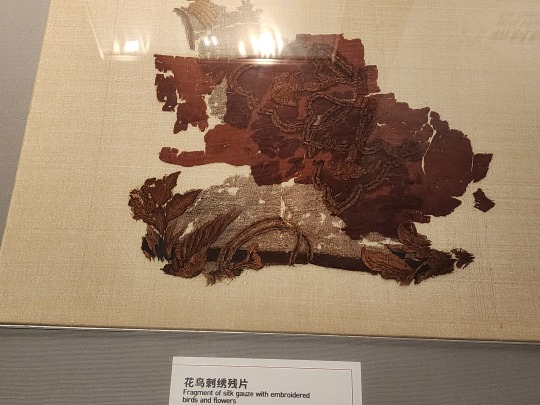
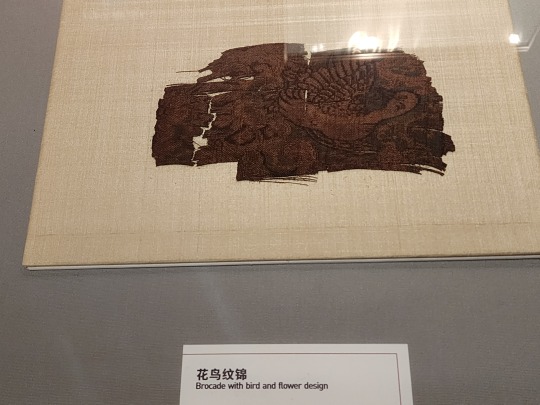
The gold threads used in these embroideries were made by wrapping long strips of gold foil around thread through the turning of these hook-shaped tools.
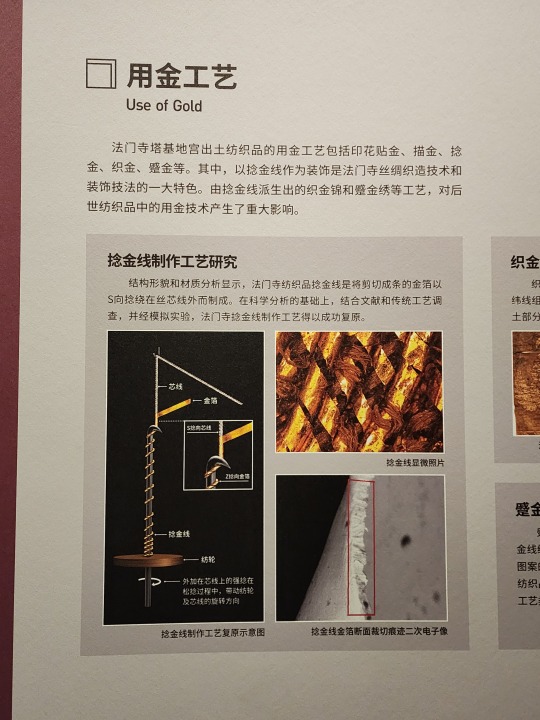
The gold threads produced from the above process were mainly used in two ways, either woven into the fabric (top), or embroidered onto fabric (bottom). The kind of embroidery here is called cujinxiu/蹙金绣, which uses gold threads and a technique that is similar to couching
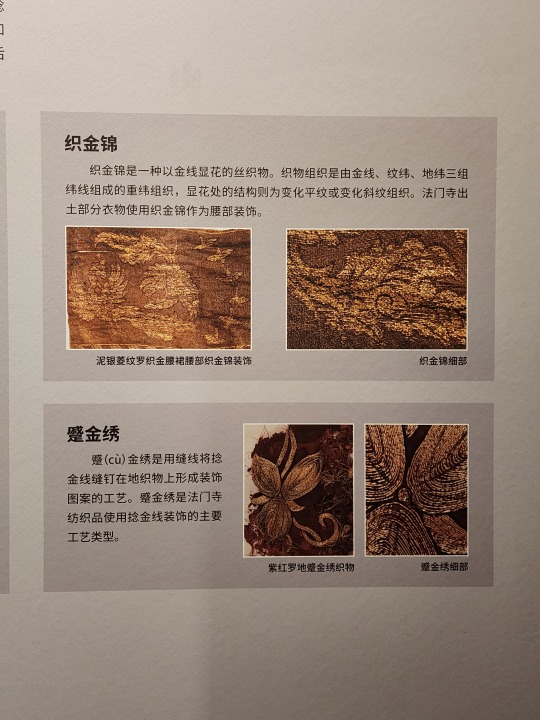
Models of the microscopic structure of different types of silk fabric found in Famen Temple. In common usage today, the term sha/纱 often refers to light, almost see-through polyester fabrics, but in the past this term refers exclusively to a type of light silk fabric. However, the other ones listed here (ling/绫, luo/罗, juan/绢, jin/锦) almost always refer to silk fabrics.
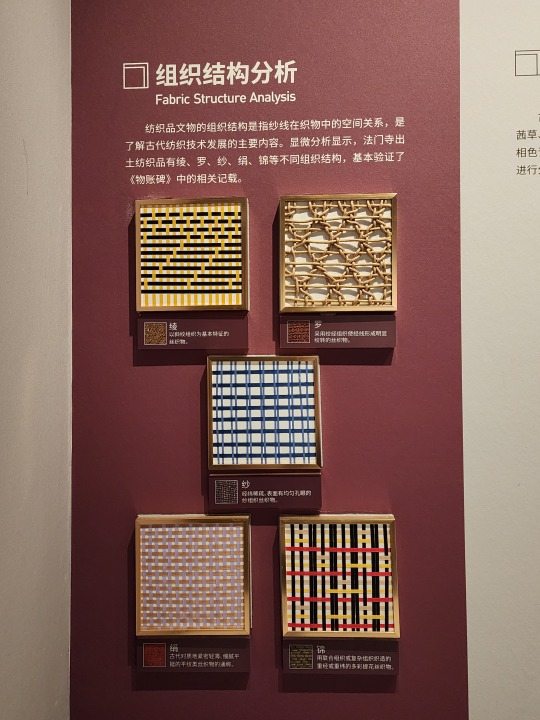
Different types of motifs/patterns found on artifacts throughout time. Left is the evolution of juancaowen/卷草��� ("curled plant motif") from Tang dynasty to Jin dynasty (1115 - 1234). Right is the evolution of lianhuawen/莲花纹 ("lotus flower motif") from Northern Song dynasty (960 - 1127) to Yuan dynasty (1206 - 1368).
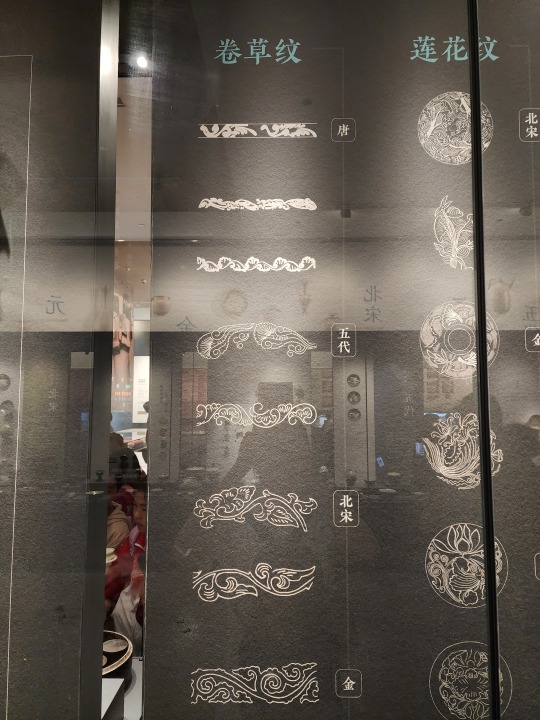
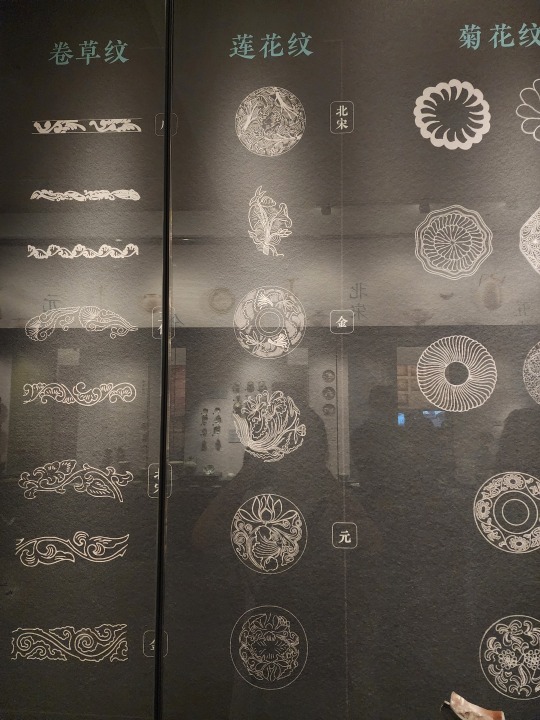
Left: evolution of juhuawen/菊花纹 ("chrysanthemum flower motif") from Tang dynasty to Yuan dynasty. Right: evolution of mudanwen/牡丹纹 ("moutan peony motif") from Tang dynasty to Yuan dynasty, and the evolution of youyuwen/游鱼纹 ("swimming fish motif") from Northern Song dynasty to Yuan dynasty.
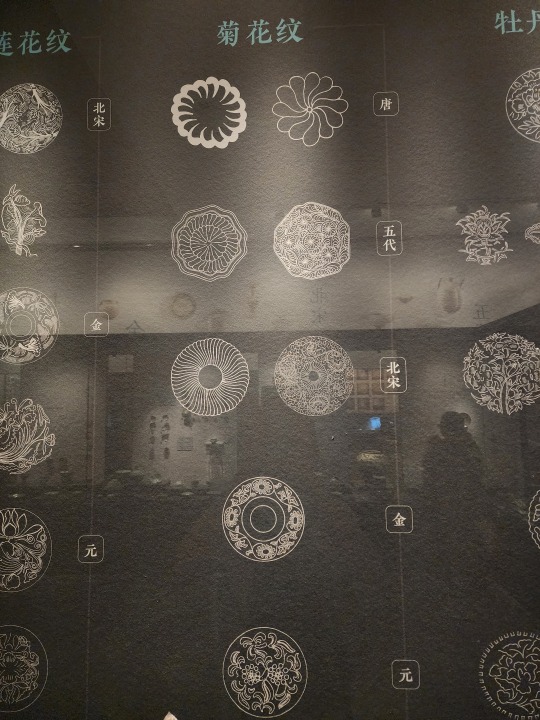
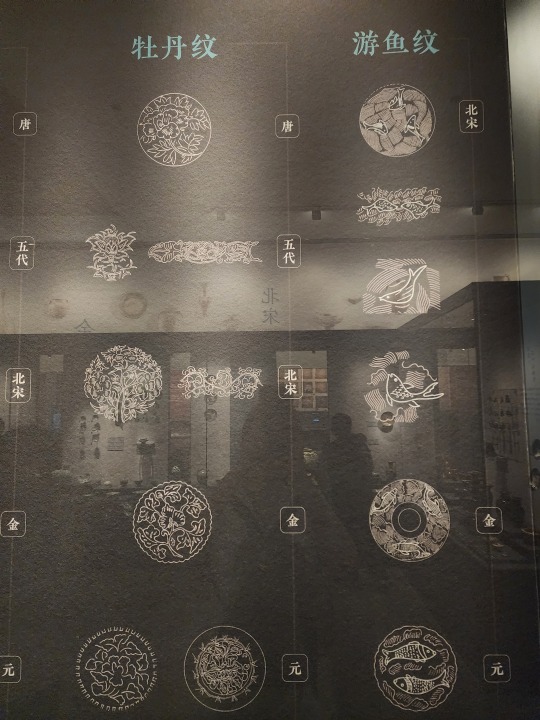
This is another one of my personal favorites, a Ming dynasty (1368 - 1644) bronze vessel with cloisonné enamel (called 掐丝珐琅 or jingtailan/景泰蓝 in Chinese). This type of vessel is called a gui/簋.
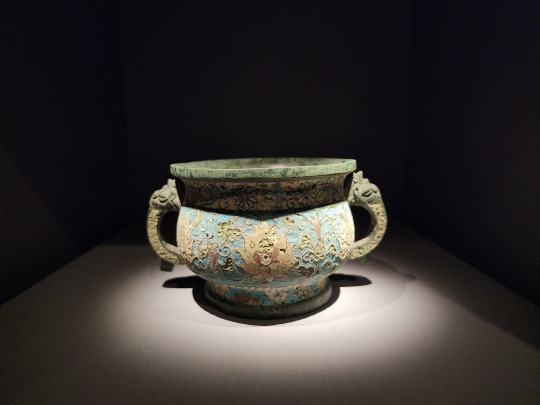
Song-era green-glazed porcelain from Yaozhou Kiln Site (耀州窑), so it's called yaoci/耀瓷 for short. This particular style is made by carving designs onto the piece before glazing and firing. I have attempted something similar when I took that wheelthrowing class years ago, but I failed lol
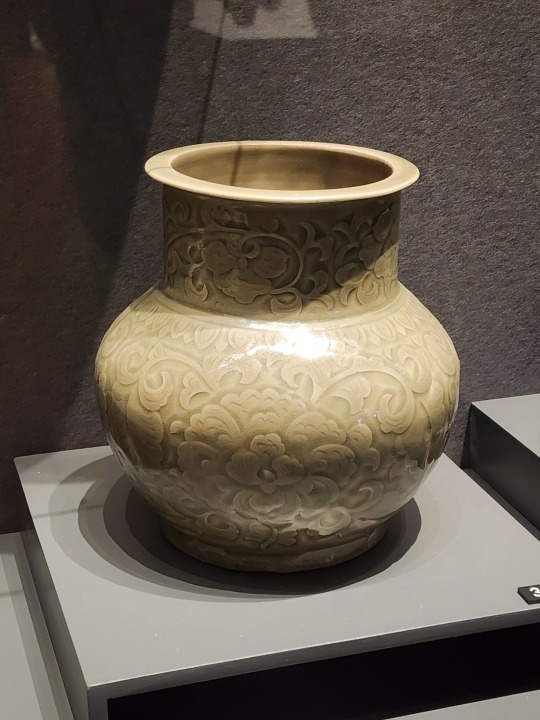
A Northern Song-era stone dui/敦 from the tomb of Lü Dalin/吕大临. The calligraphy here is in kaishu/楷书 script.
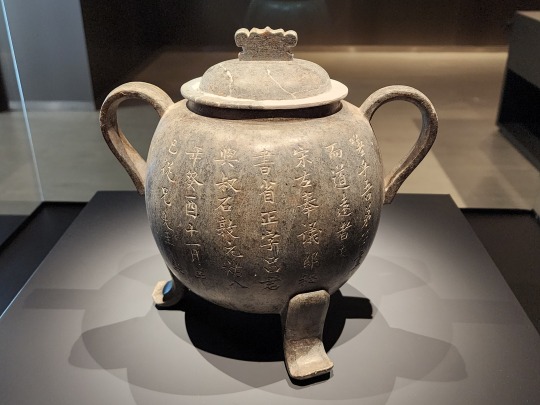
Also from the tomb of Lü Dalin, the left is a wine flagon with a dedicated holder used to warm the entire vessel along with the wine inside. The right is a incense burner with a swastika on top. Note that swastikas are very common in Chinese Buddhism, and is taken to mean "myriad" or "infinity" (the swastika is pronounced wan/萬, which literally means "ten-thousand", the figurative way of saying "infinity" in Chinese).
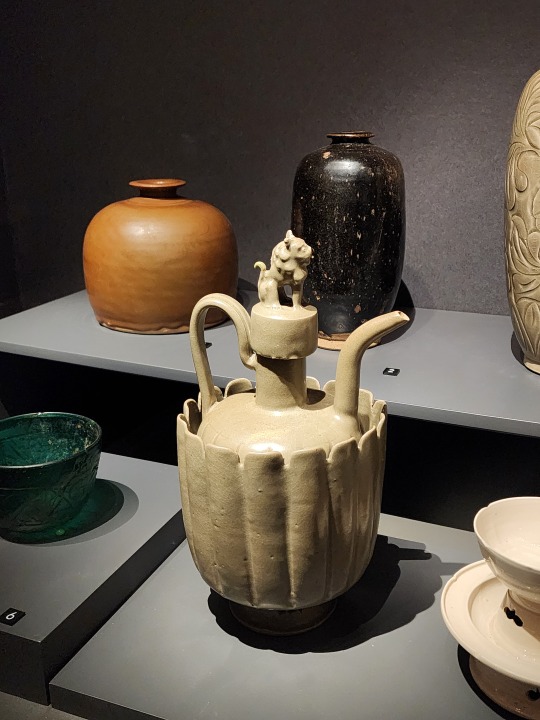
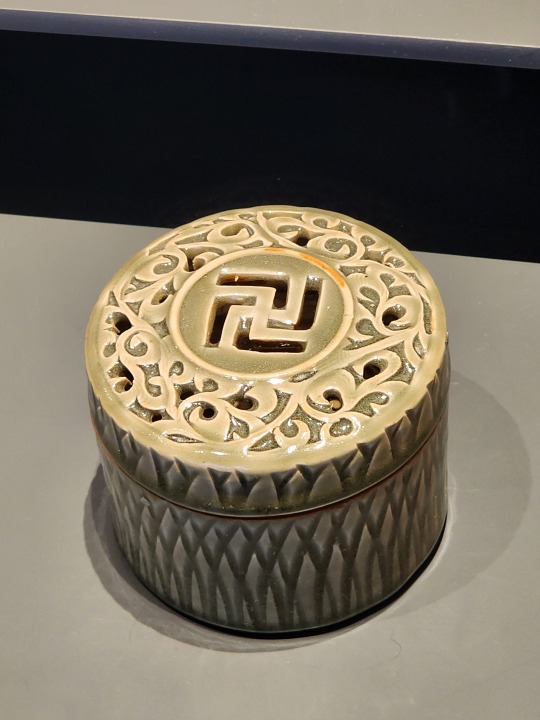
The process of making tea in Song dynasty, called diancha/点茶, which generally involves these steps: grinding the tea into a powder, sifting the tea powder, putting tea powder into a tea cup, pouring in hot water, and whisking the tea with a chaxian/茶筅 to create a light foam before drinking. In Song dynasty, the literati would hold contests among themselves to see who could make the perfect tea using the diancha method. This complex and time/effort consuming method was gradually phased out within China by the time of Ming dynasty, but deeply influenced Japanese tea making methods.
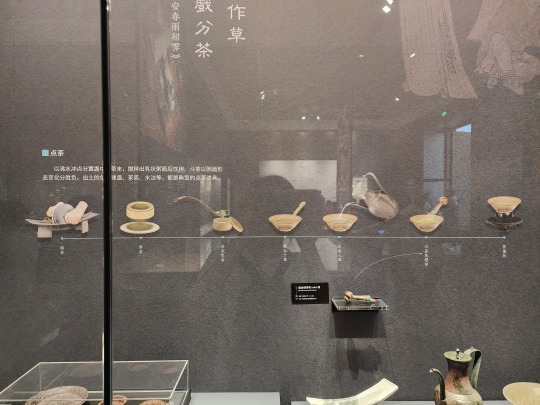
Left: a small porcelain piece depicting a mother lion and cub. The Chinese depiction of lions, called shi/狮, largely comes from a combination of the mythological suanni/狻猊, and the rare real lions that were given to China as gifts in the past. Right: a pottery dragon from Yuan dynasty, if I remembered correctly.
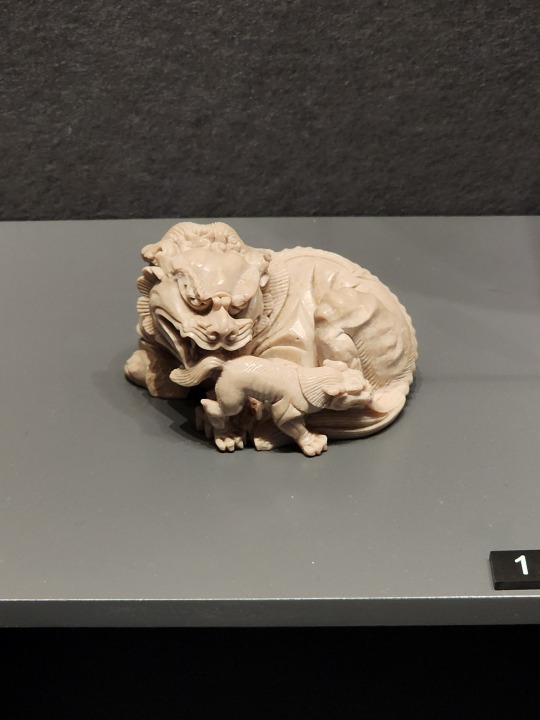
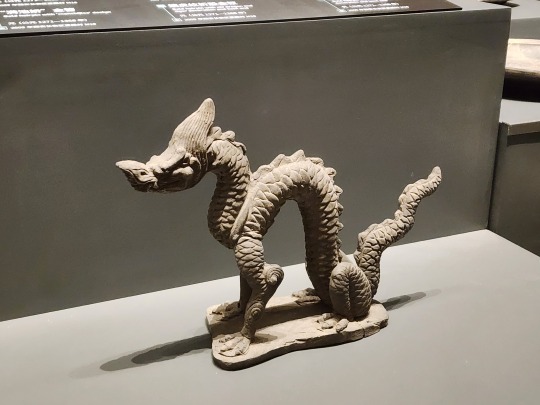
Also the previous part on Han dynasty (202 BC - 220 AD) artifacts was getting way too long, so I put these two pictures here at the end. In ancient China, many round coins had a square hole in the middle, and these holes were used to string the coins up for easier storage and counting. Such strings of coins are called minqian/缗钱, and this is why the quantifier for coins in ancient China is usually chuan/串, guan/贯, or diao/吊. In usage, chuan is not a strict quantifier, but 1 guan or diao = 1000 coins.
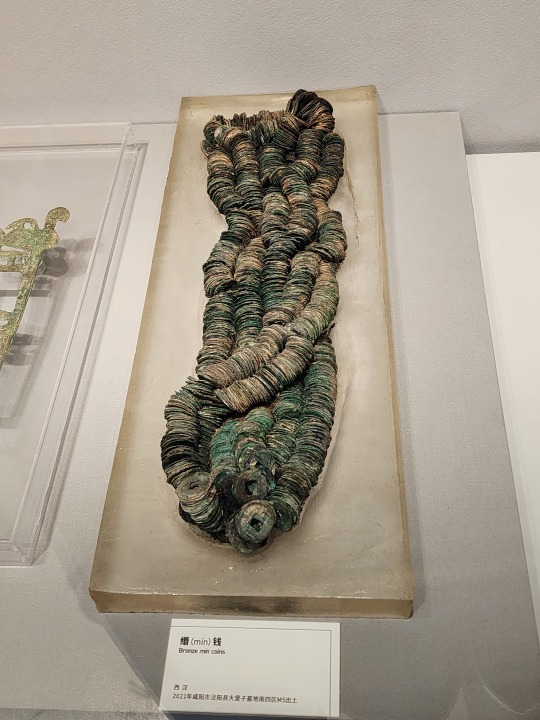
A modern recreation of a Han-era painted lacquer box, this red pattern on black background look is very characteristic of Han-era painted lacquerware:
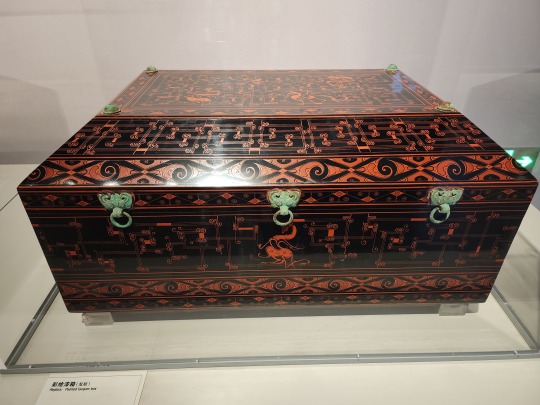
Painted pottery statue of a Buddhist deva:
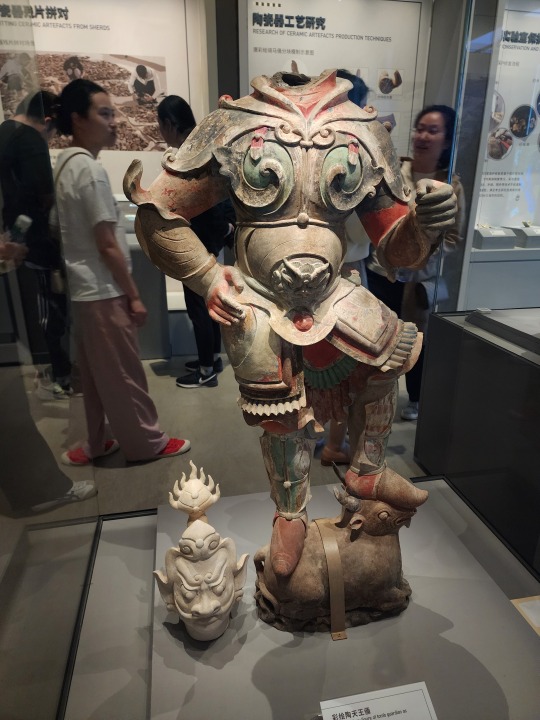
The painted wall murals of a Yuan dynasty tomb, viewed from below:
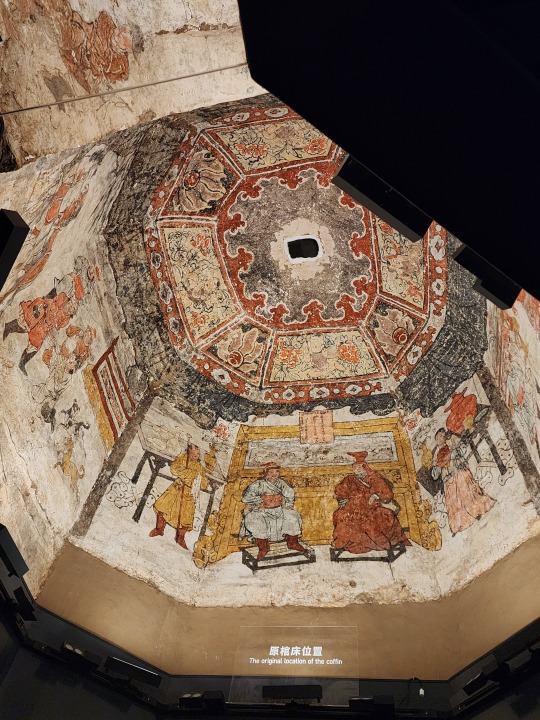
And this concludes the posts for Shaanxi Archaeology Museum! The next museum (also the last one) will be Shaanxi History Museum, specifically the new Qin-Han dynasties museum.
#2024 china#xi'an#china#shaanxi archaeology museum#chinese history#chinese culture#chinese hanfu#hanfu#chinese calligraphy#tang dynasty#song dynasty#jin dynasty#yuan dynasty#ming dynasty#embroidery#calligraphy#history#culture#archaeology
209 notes
·
View notes
Text
SAMHAIN



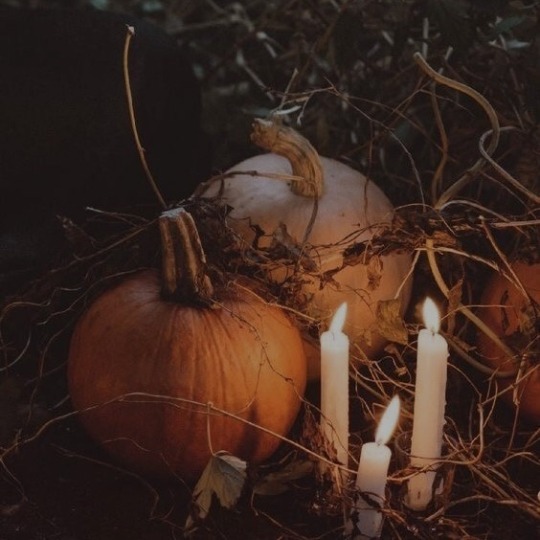

DATE: October 31st
ZODIAC: Scorpio and Sagittarius
SYMBOLS: jack-o’-lanterns, bonfires, gourds, bones, skulls, brooms, ancestor belongings and photos, masks, witches, cauldrons, and scarecrows.
INCENSE AND OILS: frankincense, myrrh, benzoin, copal, dragon’s blood, sage, rosemary, sandalwood, bay leaf, and wormwood.
SPELLWORK: renewal, rebirth, honouring ancestors, shadow work, spirit communication, protection, releasing, and letting go.
ANIMALS: black cats, owls, bats, ravens, crows, spiders, and wolves.
COLOURS: black, orange, red, purple, gold, and white.
FOOD: apples, pumpkins, squash, potatoes, betts, carrots, turnips, meats, berries, grains, and nuts.
DEITIES: Morrigan, Hecate, Cerridwen, Persephone, Hades, Lucifer, Donn, Lilith, Cailleach, Santa Muerte, Odin, Loki, and Hel.
HERBS AND FLOWERS: witch hazel, hawthorn, chrysanthemum, dandelion, blackthorn, thistle, nettle, rowan, belladonna, and hellebore.
CRYSTALS AND STONES: obsidian, smoky quartz, black tourmaline, amethyst, labradorite, garnet, bloodstone, onyx, jet, and moonstone.
#fyp#fypシ#fypシ゚viral#fypage#fyppage#tumblr fyp#witchcraft#witches#witch#witchcore#witch community#witchy things#sabbats#samhain#wheel of the year#information#helpful
185 notes
·
View notes
Text
Graveyard Etiquette
“If you take from a graveyard, you’ll leave more than you took.”
Graveyard vs. Cemetery-
A Graveyard is a burial ground attached to a church.
A Cemetery is any burial ground.
[For simplicity, I will be refering to all burial grounds as "cemeteries."]
As a paranormal investigator first and a witch second, I find cemeteries to be the least terrifying places to interact with the dead. Yes, there are bodies all around you, but in almost all cases, cemeteries are not haunted. That being said, this does not mean the cemetery is empty. In fact, it's far from it.
Gatekeeper-
Every cemetery has a Spirit designated as the Gatekeeper. They are the Guardian/Protector of the land and spirits within. This Spirit is usually from the first person buried there. Though, the job as the Gatekeeper may be taken by a physical visualization of protection for the cemetery, such as a statue (e.g., a gargoyle or angel).
When visiting a graveyard, it's always a good idea to bring an offering for the Gatekeeper.
Each cemetery has its own rules and preferred offerings. This can become more detailed when focusing on a specific spirit within the cemetery. Like people, each spirit has its own personality and tastes. When visiting a cemetery, make sure to do your research. An example: reading the Torah to the spirits of a Catholic cemetery would be seen as useless at best and rude at worst.
Offerings Ideas-
Clean the graveyard- pick up litter, and debris left behind by guests or just blown in.
Apples (an Irish tradition)
Flowers (Chrysanthemums, Hyacinth, Red Poppies, Lily, Cypress Tree, ect.)
Stones (Jewish Tradition)
When in a Cemetery-
Do:
Interact with the Graves that have less visitors
Have respect while acting normal
When dealing with children-spirits have fun, play games, or share some jokes
Don't:
Walk over the Graves
Lean/sit on tombstones
Take anything without permission
Take anything off of a grave with permission or otherwise (unless the family or keeper allows you to)
Litter
[Opinion] Whistling - Some believe this act will summon a doppelganger or forerunner to appear, and if one hears whistling, this may invite Death.
Graveyard Dirt-
In certain spells and practices, the ingredient graveyard dirt may be needed or mentioned. This, as one would assume, is dirt from a cemetery.
Always ask for permission before taking anything out of a cemetery, including the dirt
Graveyard Dirt Alternatives-
Dirt from a deceased plant
Used coffee grounds
Cinnamon powder (for protection based spells)
"The cemetery is an open space among the ruins, covered in winter with violets and daisies. It might make one in love with death, to think that one should be buried in so sweet a place." -Percy Bysshe Shelley
#witchblr#witchcraft#witch#spirit work#death witch#death witchcraft#baby witches#baby witch#witch advice#witch info#info post#beginner witch
264 notes
·
View notes


